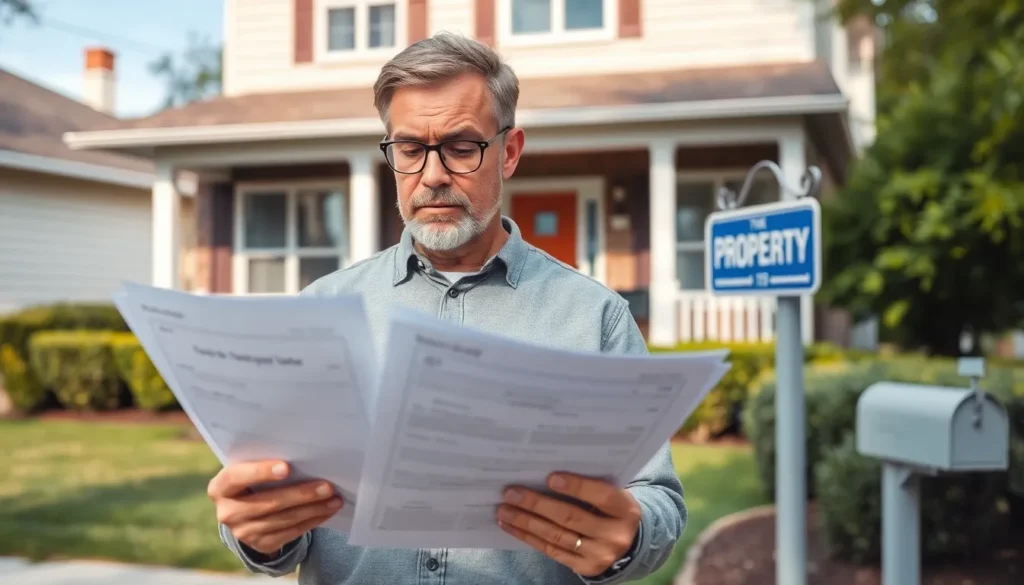Table of Contents
ToggleRenting a home might seem like a dream come true—no mortgage, no maintenance headaches, and freedom to move at a moment’s notice. But before signing that lease, it’s wise to peek behind the curtain. The reality of renting can sometimes feel like a bad sitcom episode where the punchline is always on the tenant.
From skyrocketing rents that can turn a cozy apartment into a financial black hole to the lack of control over your living space, renting comes with its own set of quirks. And let’s not forget the dreaded landlord who thinks “24-hour notice” means showing up at 5 AM. As enticing as it may sound, the cons of renting can quickly overshadow the benefits, leaving tenants wondering if they’ve made a huge mistake.
Overview of Renting a Home
Renting a home often presents appealing aspects, but it also carries significant disadvantages. Rising rent prices can strain a tenant’s budget, impacting financial stability over time.
Limited control over living conditions creates challenges for many renters. They may face restrictions on decorating, renovations, or even pet ownership, leading to feelings of dissatisfaction.
Landlord-tenant relationships often prove complex. Communication issues may arise, complicating maintenance requests or dispute resolutions.
Security deposits, typically equal to one month’s rent, can present additional stress for renters, particularly if disputes occur regarding their return.
Long-term financial investment remains absent in rental situations, as monthly payments contribute to a landlord’s equity rather than building personal wealth.
Flexible living arrangements come at a cost. The ease of moving may offset the stability that homeowners often enjoy, leading to uncertainty in living situations.
Overall, renting offers unique advantages, yet potential drawbacks frequently outweigh them. Emphasizing the financial and relational aspects highlights the realities of this decision.
Financial Drawbacks

Renting a home carries substantial financial disadvantages that can impact overall stability. Monthly payments often consume a significant portion of a renter’s income.
Monthly Payments and Rent Increases
Rising rental costs can disrupt personal budgets. Tenants may face annual rent increases, making it challenging to plan finances effectively. Some areas experience increases of 3-5% or more annually. Even with a fixed-term lease, landlords may implement increases upon renewal. Renters lack control over these changes, leading to potential financial strain. Additional costs associated with utilities and maintenance can add further financial burden. Therefore, it’s crucial for renters to budget wisely.
Lack of Equity Building
Renting a home doesn’t contribute to long-term wealth. Monthly payments go directly to a landlord, enhancing their equity rather than building the renter’s financial assets. Homeownership typically fosters wealth accumulation via property value increases. Renters miss out on potential appreciation that could enhance their net worth. Furthermore, lack of ownership means that when renters move, there’s no return on investment. This situation can leave tenants financially vulnerable, especially in unstable markets.
Limited Control Over Living Space
Renting a home often means limited autonomy in personalizing living spaces. Renters commonly face restrictions imposed by landlords regarding modifications.
Restrictions on Modifications
Decorating a rented space entails many limitations. Landlords frequently prohibit permanent changes, such as painting walls or installing fixtures. These restrictions can cause frustration, especially for those wanting to express their style. Having to adhere to a landlord’s rules can make a space feel impersonal and uninviting. Additionally, the inability to make renovations may hinder functionality in the home.
Dependence on Landlord Decisions
Tenants rely heavily on landlords for crucial decisions affecting their living environments. Maintenance requests can take longer to address, leading to prolonged discomfort or inconvenience. Landlords hold significant power over policies like pet ownership or subletting, which impacts tenants’ lifestyles. Delays in communication often compound these issues, leading to additional stress. Renters must navigate these challenges, as they lack autonomy in many areas of home management.
Stability and Security Concerns
Renting a home introduces various stability and security issues that affect tenants significantly.
Risk of Eviction
Eviction poses a serious concern for renters. Fluctuations in financial stability can lead to missed payments, resulting in notices from landlords. Eviction notices often create anxiety, especially when tenants face financial challenges. Even responsible tenants could encounter the risk if landlords make decisions based on property management strategies. Rental agreements usually permit eviction for various reasons, including late payments or violations of lease terms. This lack of permanence can disrupt lives, prompting unstable living situations and affecting overall well-being.
Uncertainty in Housing Market
Uncertainty in the housing market can impact renting experiences. Rising rental prices frequently strain budgets, forcing tenants to reconsider their housing options. Market instability often leads to abrupt rent increases, making it challenging to plan long-term finances. Annual rent hikes of 3-5% are common, but sudden spikes can occur. Those fluctuations might not align with tenants’ income growth, leading to unforeseen financial burdens. Additionally, unexpected changes in neighborhood dynamics can influence rental costs, causing further instability. Renters may feel trapped as property values shift, hindering their ability to find affordable housing.
Emotional and Lifestyle Impact
Renters often experience significant emotional and lifestyle challenges due to the nature of their living arrangements.
Transience and Lack of Permanence
Transience affects many renters, as their living situations frequently change. Moving every year or two creates stress and uncertainty, impacting mental well-being. Security concerns arise with the risk of eviction, especially during financial instability. Without the stability of homeownership, individuals may feel unsettled. Frequent relocation disrupts social ties and limits opportunities to establish lasting friendships. Many renters also face difficulties in building a sense of belonging within their neighborhoods. This lack of permanence can lead to feelings of isolation and frustration.
Community Engagement Challenges
Community involvement becomes challenging for renters. Many individuals hesitate to invest time and resources in temporary living situations. Therefore, participating in local events or initiatives often takes a backseat. Strong connections with neighbors become harder to develop, as turnover rates in rentals are higher. Renters frequently find it challenging to form deep relationships that contribute to lasting community bonds. Additionally, those who wish to support neighborhood improvements face barriers due to temporary residency. As a result, feelings of disconnection from the community often surface.
Renting a home comes with significant challenges that can overshadow its benefits. Rising rents can strain budgets and limit financial stability. The lack of control over living conditions often leads to frustration and dissatisfaction. Additionally the complexities of landlord relationships can create further stress for renters.
The emotional toll of transience can disrupt social connections and hinder community engagement. For many individuals and families the drawbacks of renting may prompt a reevaluation of their housing choices. Understanding these cons is essential for making informed decisions about one’s living situation.






